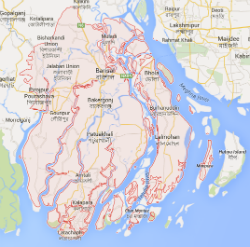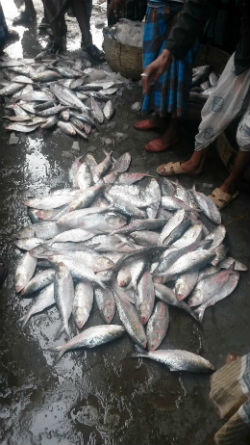This is my first blog as part of our brand new initiative, mNutrition; a joint collaboration with GSMA mHeath programme supported by DFID. In last November as part of the service design field trip with our mAgri Challenge Fund Grantee, Grameenphone, we went out in rural Bangladesh to meet farmers from different backgrounds.
In this blog I’m going to share my experiences from the wholesale market at fish boatyards in a location that is called Barisal. Barisal City is a port on the Kirtankhola river, on the northern shore of the Bay of Bengal in southern Bangladesh; 142 km (373 km by road) from the capital city, Dhaka.
 Barisal is famous for its river water fish market with its well-established value chains and market dynamics. The components of the value chain I had identified include:
Barisal is famous for its river water fish market with its well-established value chains and market dynamics. The components of the value chain I had identified include:
1. Boat and fishnet owner
2. Boat driver (helmsman) & Fishermen
3. Boatyard bulk buyers
4. Auctioneers
5. Wholesalers and retailers
6. And the final consumer
Boat and fishnet owner:
In most cases, fishermen can’t afford to buy their own boat or net. Often those who do own boats or nets prefer to avoid the operational hazard of fishing and instead rent out their capital. A boat can cost in a range from BDT 50,000 to BDT 500,000 (GBP 420 to 4200) and a big net can cost up to BDT 200,000 (GBP 1700). Boat and fishnet owner usually rents out this fishing equipment to the boat driver (helmsman) and gets a commission of 10-12% of the total catch before deducting any other expenses. They get paid two to three times a week.
Boat driver (helmsman) & Fishermen:
The boat driver or the helmsman is in charge of gathering the required people to form his team for fishing. The helmsman is responsible for distributing the wages to the team, often before setting sail. Journeys often take at least a week before returning to shore. Income distribution in this group is very interesting. First the boat driver will deduct all expenses like fuel, food from the total sales amount then divide that in 16 parts. The boat driver will keep 4 parts as his portion and will distribute the rest to his fishermen in equal share. Fishing times can vary from rivers to rivers and from seasons to seasons. Usually fishermen like to fish during night and early morning when school of fishes are on the surface of the river water and easy to catch with net.
Boatyard bulk buyers:
Bulk buyers are financed by the wholesalers and buy fish from the boat when they come to shore. Usually they have preselected boats to buy from, which they communicate from time to time prior to purchase while the boats are at sea. The wholesalers finance these people and ensure they are getting the fish. These bulk buyers usually make their profit from the auction price. They set the bottom threshold of the auction price and upsell to the wholesalers. There can be hundreds of bulk buyers under single wholesaler. They buy fish every 30 minutes as long as flow of fish are coming in.
Auctioneers and Wholesalers:
This group of people are the closest to the consumer and act as a customer of the wholesalers. Once the fish are taken to the boatyard wholesale market, ‘Boatyard bulk buyers’ put the fish on-spot auction. As I said earlier, they set the bottom threshold of the auction, so whoever gives him the highest margin, the fish will go to him. But the interesting fact is, whatever auction happens, it happens under the name of the wholesaler. The wholesaler is always there to get his cut of the price and usually it is 2% of the auction price and buyers pay this 2%. A wholesaler can have few hundred transactions in a single day and he generates profit every 5-10 minutes, as long the market is open. Usually during the rainy season the market is open 24 hours.
 Retailers:
Retailers:
Fish retail markets in Barisal and in other parts of the country are scattered and are not regulated by any particular business model.
Pain points for this river water fish market:
There are several areas where the value chain members are suffering from non-existence of information flow. Other than information they also don’t have access to banking or insurance.
Pain points and opportunities for mAgri:
No information on weather: With the lack of formal weather forecasts fishermen are completely dependent on their fate. They get weather warnings only if there is a big storm coming in. Some fishermen have access to weather forecast from radio but only few of them have this privilege. So a big opportunity area exists for weather information through mobile. Almost all the fishermen and their families have access to mobile phone and have a basic handset to make calls even when they are fishing.
No access to market price: these fishermen are completely dependent on market prices decided by the bulk buyers and wholesalers. Even if the price is high in urban areas, they have to sell their fish at the base price set by the wholesalers.
No access to banking and insurance: these fishermen don’t go to a bank because they are stuck in the vicious circle of micro credit to the boat owners and/or net owners. In many cases the wholesalers are the owner of the boat and the net, so it is near to impossible for these fishermen to come out of this circle and own a boat or a net. Even if they own a boat and a net, only few wholesalers will be buying fish from them and prices will be relatively low.
No access to insurance: Very often fishing boats are capsized causing high costs to the fisherman. Most ordinary fishermen don’t have access to insurance facilities, thus increasing the vicious debt circle.
These are a number of opportunity areas available for organizations that want to provide weather updates, market price, banking and insurance services. The vast majority of fishermen live in rural areas, making it perfect for mAgri providers to cater to their information need. We will be looking around for any probable partnership that can reach out to these fishermen in Bangladesh to provide them with this information.
Contact the mAgri team at [email protected]

